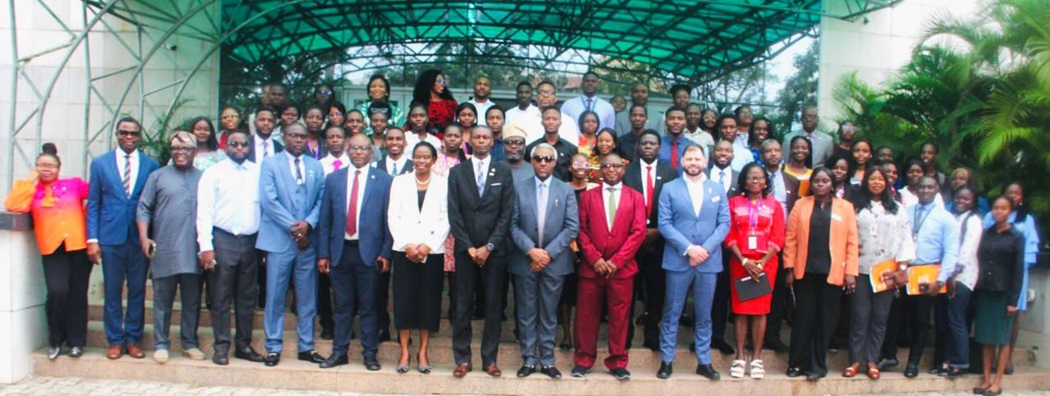Covenant University’s Covenant Applied Informatics and Communication Africa Centre of Excellence (CApIC-ACE) marked a significant milestone in its cancer research endeavour with the commencement of its Precision Oncology Workshop on Monday, October 14, 2024.
The event, held at the Covenant University Center for Research Innovation and Discovery (CUCRID) and organized in collaboration with Illumina and ISN, aims to elevate the standards of cancer care in Nigeria and the West African region.
The workshop's theme, ‘Personalizing Cancer Care in Africa through Genomics,’ aims to stimulate interest and build capacity in genomics research, addressing a critical gap in cancer care.
Representing the Vice-Chancellor, Covenant University, Professor Abiodun Adebayo, the Director, Covenant University Center for Research Innovation and Discovery (CUCRID), Professor Conrad Omonhinmin, welcomed the participants to the event, while pointing out that collaboration is at the forefront of cancer research and should go deeper than its current representation. He applauded the partnership, between Illumina and CApIC-ACE, expressing hope that it would lead to significant capacity building in the field of genomics.
Professor Omonhinmin, emphasized the need for ongoing collaborations and expressed a desire to see post-workshop activities with clear deliverables that align with the discussions held. He underscored that solving these challenges is a responsibility that falls on the conveners.
Earlier in her welcome remarks, the Registrar, Covenant University, Mrs. Regina Tobi-David, noted that oncology is a rapidly advancing discipline, and the breakthroughs witnessed testify to the collective dedication and efforts of professionals in the field. She highlighted that the event provides a unique opportunity to explore the latest innovations in cancer research, clinical practice, and therapy advancement.
She expressed her trust that the discussions and collaborations during the workshop will play a crucial role in improving cancer diagnosiss. She encouraged participants to actively engage, ask questions, and share their experiences to learn from one another about the possibilities in cancer treatment. She believed that through this event, hope could be brought to countless people around the world.
Dr. Arisegi Sharafadeen Adeniyi represented the Director General of the National Institute for Cancer Research and Treatment (NICRAT). In his remarks, he acknowledged that the collective mission to combat cancer is one of the most challenging issues of our time, describing it as a complex challenge. He emphasized the need to minimize trial-and-error approaches in the search for a cure, and highlighted that achieving a cure for cancer is attainable if researchers continue to collaborate effectively. He urged everyone to focus on capacity building in areas such as research, data collection, training and education, infrastructural development, public and private sector collaboration, and legal frameworks, as these will contribute to global breakthroughs.
In his remarks, Dr. Tolulope Adewole of the Nigeria Sovereign Investment Authority (NSIA), praised the work being done at CApIC-ACE. He announced that they are not only building more Cancer Centers across the country, but also establishing thirteen new diagnostic centers, with state-of-the-art Genomic studies planned for Lagos and Abuja. He emphasized that there is a promising future for those who have chosen to remain in the country, noting that those who left will return to see a better environment. He encouraged researchers to continue to work hard; highlighting the bright future ahead for them.
Making his remarks at the event, Professor Emeka Iweala, Centre Leader, CApIC-ACE, emphasized the workshop's role in fostering a deeper understanding of precision oncology. He underscored the importance of interdisciplinary collaboration between clinicians and basic scientists in achieving effective cancer treatments. "The goal of precision oncology is to deliver the right cancer treatment to the right patient, tailored to their unique genetic profile," he stated.
Professor Iweala, pointed out that CApIC-ACE, is funded under the World Bank ACE Impact project, and dedicated to capacity building among African scientists and clinicians. He noted that the center has successfully trained over 160 postgraduate students, 200 researchers and clinicians, while also empowering more than 2,000 community members with vital information about prostate cancer, breast cancer, and malaria.
He reaffirmed CApIC-ACE's commitment to enhancing industry-academic collaborations, stating, "Together with our partners, we will continue to support capacity building and groundbreaking research to improve treatment options for prostate and breast cancer patients in Nigeria."
He expressed gratitude to stakeholders, including the leadership of Covenant University, Illumina, and ISN, for their invaluable support in making the workshop a reality. He also acknowledged the organizing team and participants for their commitment to advancing cancer care in Africa.
"This workshop is a pivotal initiative aimed at transforming cancer care on the continent," he concluded, urging all participants to engage fully in the training sessions.
The event featured educational sessions on translational science, innovative research, and clinical approaches to cancer management, alongside panel discussions and hands-on training. Participants had opportunities to network with leading experts and researchers, generating new insights tailored to the African context.


.jpg)